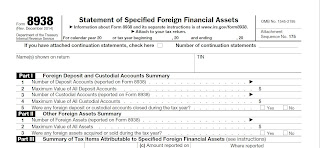In Rev Proc 2022-18, 2022-13 IRB 933, the IRS waived the residency and presence tests applicable for the 2021 Code Sec. 911 foreign earned income and foreign housing cost exclusions with respect to certain U.S. individuals in:- Iraq,
- Burma (Myanmar),
- Chad,
- Afghanistan, and
- Ethiopia
due to adverse conditions in those countries.Code Sec. 911(a) and Code Sec. 911(c)(4) allow a "qualified individual" to exempt from taxation the individual's foreign earned income (up to the exclusion amount of $108,700 for 2021) and the housing cost amount.
A qualified individual is an individual whose tax home is in a foreign country and who is either: (1) a U.S. citizen (or, in certain situations, U.S. resident alien) who satisfies the IRS that they have been a bona fide resident of one or more foreign countries for an uninterrupted period that includes an entire tax year (bona fide foreign residence test), or (2) a U.S. citizen or resident who, during a period of 12 consecutive months, is present in one or more foreign countries for at least 330 full days (foreign physical presence test). (Code Sec. 911(d)(1))
Under certain circumstances, the time requirements of the foreign residence test and the foreign presence test may be waived. If these requirements are waived, the taxpayer is treated as having met the foreign residence requirement for the period during which they were a bona fide resident of the foreign country, or the taxpayer will be treated as having met the foreign presence requirement for the period during which they were present in the foreign country.
Three conditions must be met for the waiver to apply: (1) the taxpayer must have been a bona fide resident of, or present in, a foreign country for a certain period; (2) before the taxpayer meets the time requirements for the foreign residence test or the foreign presence test, they must leave the foreign country during a period in which IRS determines, after consultation with the State Department, that individuals had to leave the foreign country because of war, civil unrest or similar adverse conditions in that country that prevented the normal conduct of business by those individuals; and (3) the taxpayer must establish to IRS's satisfaction that he could reasonably have been expected to meet the time requirements but for the war, civil unrest or similar adverse conditions. (Code Sec. 911(d)(4))
For 2021, the Treasury secretary, in consultation with the secretary of state, has determined that war, civil unrest, or similar adverse conditions precluded the normal conduct of business in the following countries beginning on the specified date:
Country | Date of Departure On or After |
Iraq | January 19, 2021 |
Burma | March 30, 2021 |
Chad | April 17, 2021 |
Afghanistan | April 27, 202 |
Ethiopia | November 5, 2021 |
For example, for purposes of Code Sec. 911, an individual who left Iraq on or after January 19, 2021, will be treated as a qualified individual for the period during which that individual was present in, or was a bona fide resident of, Iraq if the individual establishes a reasonable expectation that he or she would have met the requirements of Code Sec. 911(d) but for those conditions.
To qualify for relief under section Code Sec. 911(d)(4), an individual must have established residency, or have been physically present, in the foreign country on or before the date that the Treasury secretary determines that individuals were required to leave the foreign country. Thus, for example, individuals who were first physically present or established residency in Iraq after January 19, 2021, are not eligible to qualify for the exception provided in Code Sec. 911(d)(4) for 2021.
Have IRS Tax Problems?
Contact the Tax Lawyers at
Marini & Associates, P.A.

.jpg)



.jpg)















